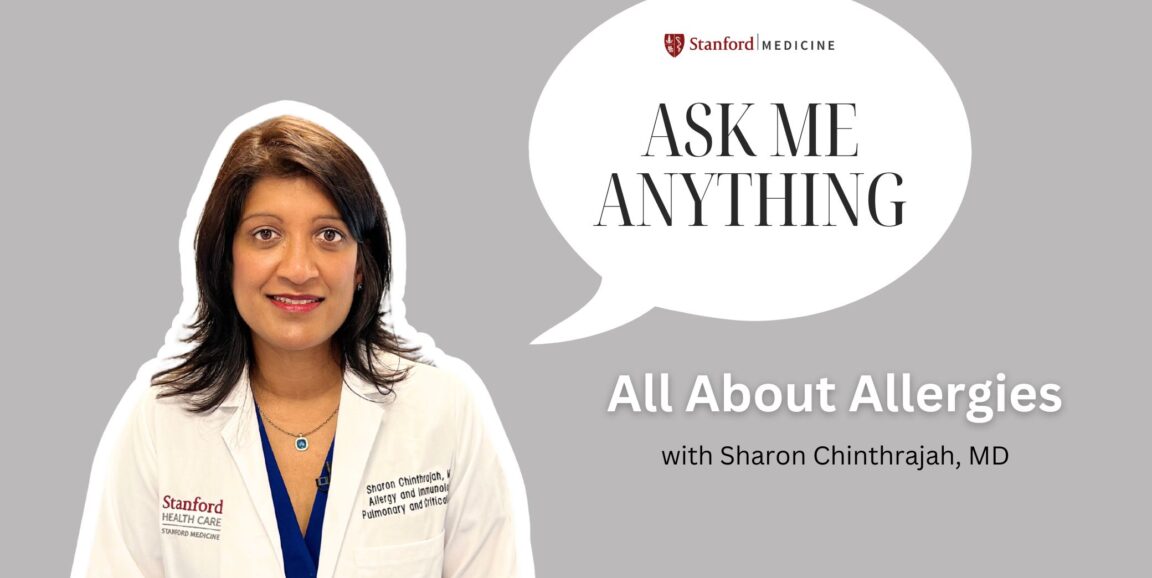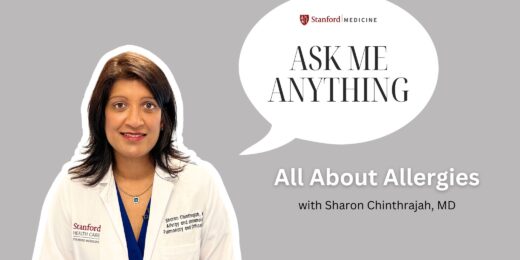Spring has sprung ... a leak in our noses.
Alongside beautiful blooms and sunny skies, springtime also inflames the immune systems of seasonal allergy sufferers, casting a shadow on an otherwise lovely time of year.
So what exactly happens when the body has an allergic reaction? Are there ways of treating it or stopping it altogether? What about allergies to foods? Are those different? What does the latest research say?
Sharon Chinthrajah, MD, associate professor of medicine and of pediatrics, and the director of the Sean N. Parker Center for Allergy and Asthma Research, answered all of those questions and more in a recent Ask Me Anything LIVE.
Here are the highlights from Chinthrajah's conversation with Lisa Kim, edited for clarity and length.
Let's start at the basics. What is an allergy?
An allergy happens when your body mistakes things in the environment, like in the air, as toxic or dangerous, and the immune system mounts a reaction to rid your body of these so-called toxic products. Over the history of human development, we've had to fight off worms, parasites, and other pests that we're exposed to through our skin or eating foods that are contaminated, and the immune system creates antibodies to recognize these invaders, and that triggers a release of chemicals to rid the body of these products. That leads to a histamine release, which is part of an inflammation response, which we see in many allergic symptoms -- red, teary eyes, runny nose, sneezing. That's our body's way of trying to wash that toxin out and expel all of these substances.
Red, teary eyes, runny nose, sneezing. That's our body's way of trying to wash that toxin out and expel all of these substances.
Are allergies happening earlier than usual this year?
Every year someone asks me this question, and it seems like the answer is yes. In California, we're subject to drought and heavy rains. The rain leads to super blooms. So while we hope for snow in the Sierras and precipitation to assuage drought, lots of rain means more flowers and more growth of grasses. That impacts the environmental elements that are in the air.
Does climate change play a role?
We know that climate change can lengthen the time for seasonal allergies. Data from Stanford showed that tree pollen and grass pollen seasons were lengthening in time -- starting earlier and ending later. We think that for some plants, climate change has increased the amount of pollen that's released into the air, but whether that impacts the severity of symptoms is really hard to track.
Does eating local honey help ease seasonal allergies?
The idea behind honey is that it's trapping pollens that are local to that environment, and if you ingest it, you will introduce small amounts of those pollens to your immune system. But when you eat honey, it's broken down in your digestive tract, and we're not sure how much of those pollens are then actually exposed to your immune system. The difference between allergy shots or sublingual immunotherapy, or little drops underneath your tongue, for seasonal allergies is that the dose of the allergen is higher, and it's administered in a controlled way.
There are a variety of over-the-counter medications that allergy sufferers can take, but what if they don't work? When should I see a doctor?
Over-the-counter medicines can be effective, and many are antihistamines, which aim to stop the effects of allergic inflammation. You don't need a prescription for them, and there are generic and brand names, so quite a variety. I tell my patients to try different versions of allergy medications, because some work better than others, depending on the individual. And you can switch between them if their efficacy starts to decrease.
I recommend seeing a doctor when it gets to the point that it's impacting your day-to-day and you're unable to do what you want. Doctors can offer allergy shots if appropriate, and that basically takes a small amount of the thing you're allergic to and puts it in a shot form to desensitize your body to the allergen.
I recommend seeing a doctor when it gets to the point that it's impacting your day-to-day and you're unable to do what you want.
Do you ever grow out of an allergy?
Some people do outgrow allergies, but some don't. In many ways, allergies are a product of our environment, and our environment is ever-changing. Everyone's different. We don't know the biological events that led to the development of allergies in every person, or how to tamp down the response. What I try to tell my patients is to try to restore the things that you can, such as the skin barrier. Try to hydrate your skin. If you have eczema, that dryness is a skin breakdown where you're letting outside in. It's also important to try to sleep better, eat better, exercise better -- getting outside and getting vitamin D is really important. Those are the simple things that we all talk about that can be hard to do. I find it challenging to do all of those things consistently, too. But that's how we can start to restore our immune system.
Can adults develop allergies later in life?
Not everyone does but it can happen. I think it's a combination of factors -- one is the hygiene hypothesis. That hypothesis says that we're living in cleaner environments, we're using a lot of hand sanitizer, we're trying to protect ourselves from dirt and using a lot of soaps. But those behaviors aren't always good. You get rid of helpful bacteria on our skin and in our gut, and you can also break down that first line of defense for the immune system, our skin barrier. And that makes the barrier leaky, so the outside environment gets in.
Food allergies can be more serious than seasonal allergies, some of them can be life-threatening
Can you talk about food allergies?
Food allergies can be more serious than seasonal allergies, some of them can be life-threatening. The rate of deaths from food allergy is small, but in my mind they're preventable. And there are new medications that can really help mitigate that risk. Now, food allergies affect two kids in every classroom. Similar to seasonal allergies, food allergies are caused by antibodies recognizing proteins and foods that the body interprets as toxic or dangerous. When you're eating a food that you're allergic to there are proteins from that food that are circulating all throughout your body. And your immune cells recognize those foods and cause allergic reactions to occur in all of your organs. When it's severe, that's what leads to anaphylaxis, which involves the heart and lungs and can lead to death if not immediately treated.
Severe allergic reactions are usually treated with epinephrine. How does that work?
Epipens are really important, life-saving medications. It stops an allergic reaction right away. For food allergy patients or stinging insects, like bees, we tell people to carry epinephrine auto injectors so that they can stop a severe allergic reaction before it gets dangerous. The epinephrine basically puts a stopper in all of the leakiness that happens during an allergic reaction. It tightens up everything up. And it's actually really important to have two auto injectors, because the drug acts really quickly -- within seconds -- but it can also wear off.
You had a recent study that looked at a new medication kids could take to avoid a severe allergic reaction. Can you tell me more about it?
The medication that you're talking about is commonly known as Xolair, or omalizumab, and it's antiallergic antibody. It's a drug that recognizes allergic antibodies and sponges it up, taking it out of circulation in an allergic person. The study we conducted looked at almost 200 kids who took this medication over four months. Then we tested whether they could change their threshold for the amount of food that they react to. And they could. We were super excited because we saw that about two thirds of the people who took the drug were then able to safely ingest small amounts of the foods that they were allergic to.
That's a game changer for parents, because there's a certain extra degree of freedom. You've got another blanket of protection when your child is going out to eat and you're not carefully scrutinizing every single ingredient on the menu or snack wrapper. There's less worry that your kid will eat something forbidden and be in danger. It's not a blanket solution, but it definitely helps. The drug is now approved for children down to the age of 1, which is so important, because we're diagnosing food allergies in infants.
How should parents introduce high-risk allergy foods to babies?
This has been a paradigm shift. Doctors used to tell parents to avoid the high-risk allergy foods and to not introduce them into the child's diet. But we've learned that was actually creating more food allergies. Now we recommend doing early introduction of foods, such as peanuts or eggs, into the diet for babies, four to six months. If a family has a history of another food allergy, or that baby has eczema, then they may want to see an allergist about how they introduce these foods into the diet.
What are the key takeaways for mitigating the effect of allergy season?
It all goes back to the basic principles of having a healthy lifestyle. You need to move and have diverse foods that get you to a healthy setpoint. Eat right. Sleep right. Moisturize. Make smart decisions when you go outside -- after it rains is a great time because rain takes pollen out of the air. And after you go outside make sure that you clean up. Change out of your clothes and wash up in an evening shower.
More Ask Me Anything
- Karen Adams on menopause
- Zakia Rahman on skin cancer and skin care
- Michelle Hauser on diets, cooking and healthy eating
- Andrew Huberman on neuroscience
Image: Hennadii Tantsiura






